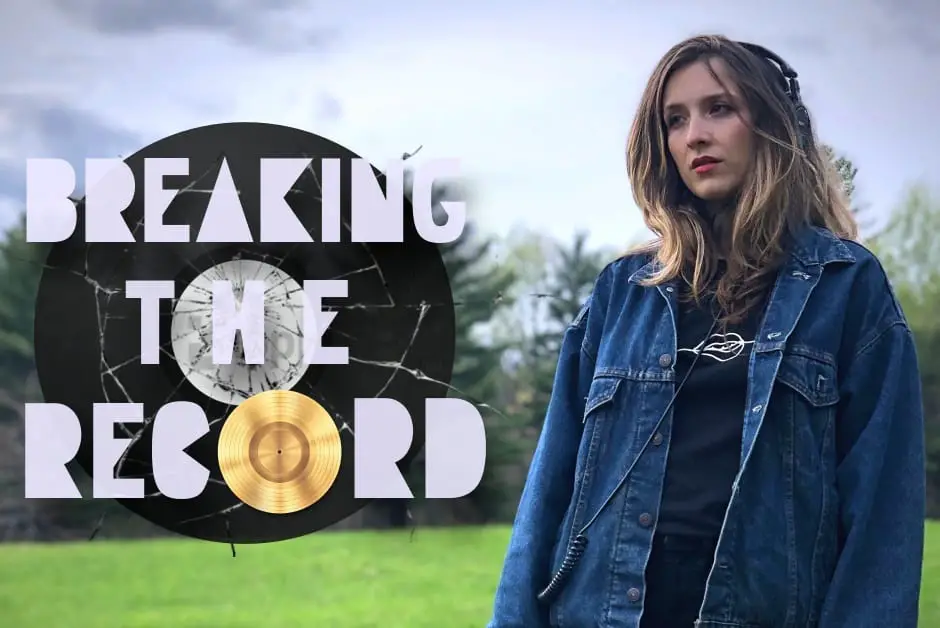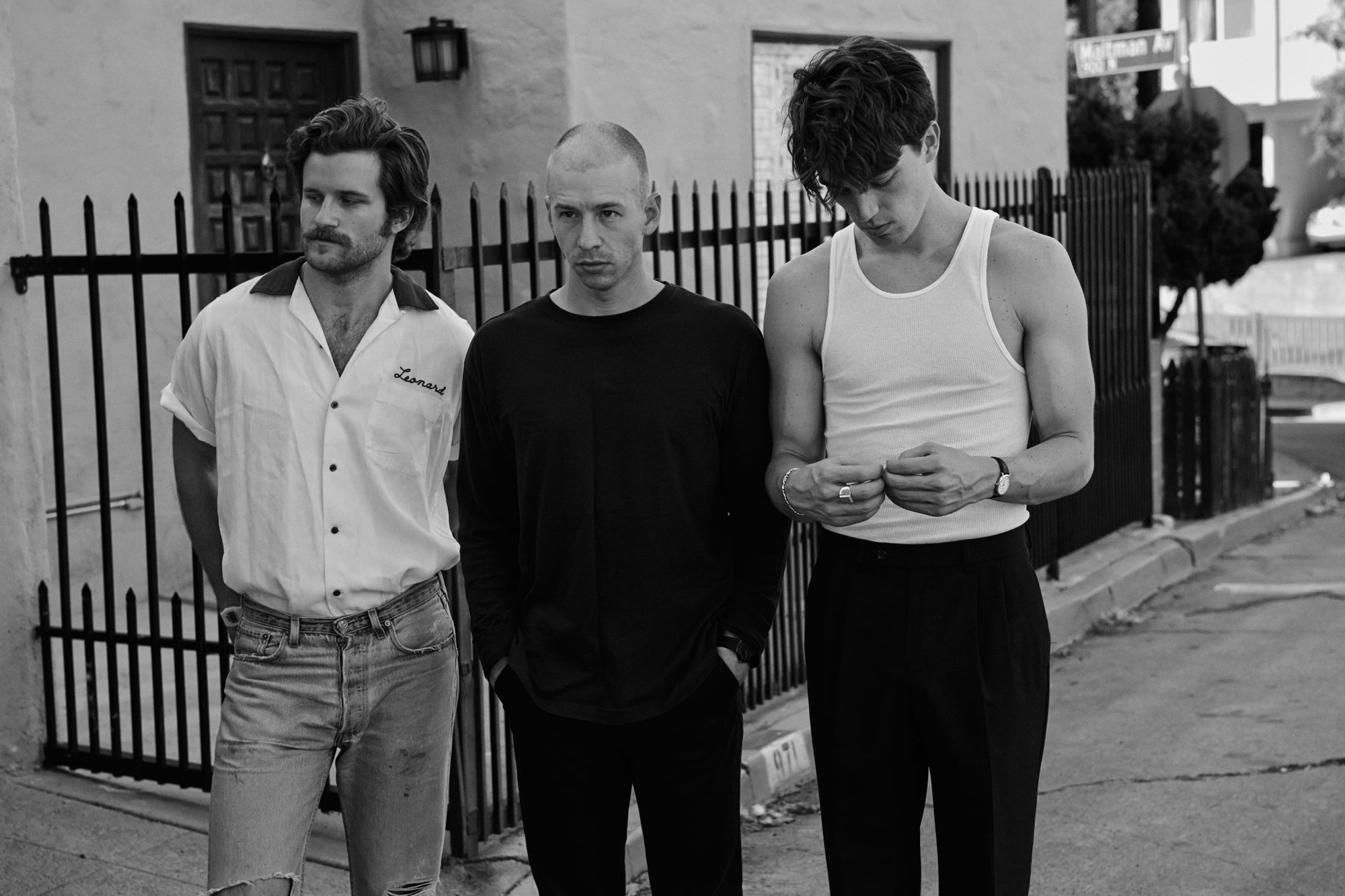The punk band’s tenth full-length and first since 2017 might resonate with longtime fans rather than those who had a flirtation with punk adjacency in their youths.
Stream: ‘Tomorrow Never Comes’ – Rancid
I had gotten about 1,500 words, give or take, into a previous draft of this when, upon doing some more in-depth internet sleuthing and research, I realized that a small portion of those 1,500 words, and therefore more words certainly to come, were hinging on a memory that was ultimately fabricated on my part—presumably constructed and based on an assumption I made by using other memories from the time as context clues.
And because this memory, or presumption, has turned out to be false, and I have been, thus far, unable to prove to myself anything on the contrary, the conceit, or at least part of the conceit, of this piece, then has to shift to accommodate.
And that, I guess, means that I have no idea how or when I first heard of the band Rancid.
Do you remember “Flux Magazine”?
It’s okay if you don’t—you might not, actually, unless you were a pre-teen, or teenage boy, during the mid-1990s, because it was a magazine that was writing about very specific things that appealed to a very specific demographic, and of all the things that I have forgotten in my lifetime, and of all the things I have retained in my lifetime as well, for whatever reason, I think about “Flux” quite a bit, honestly—mostly just the first issue, which was published in August of 1994.
I was 11 years old, and heading into the sixth grade.
And 1991 might formally or objectively be “The Year Punk Broke,” but for me, personally, the year punk broke was 1994—the summer when MTV was dominated by bands like Green Day and The Offspring, and what I am trying to recall now, and in doing so, manufactured the memory, or circumstances under which I would have been introduced, at the age of 11, to the band Rancid, and if near the end of 1994, or the beginning of 1995, when I purchased a cassette copy of their second full-length, Let’s Go, and slid it into my walkman, if I had, in fact, heard anything off of it in advance—catching, perhaps, the video for the snarling, trudging, infectious single “Salvation” some evening on MTV, or if it was a blind buy based on my growing interest in the genre.
And if it was a blind buy, what I had presumed, was that I had either read a blurb about the album, or seen an advertisement for it in an issue of “Flux”—a magazine that lasted, at least in print in the United States, all of seven bi-monthly issues before shuttering.
The first issue of “Flux”—the one that comes to mind immediately when I think of the magazine itself and the stranglehold it had on me from when it caught my eye on the newsstand, featured the title in large, “edgy” red letters across the top, with the sidebars promising stories about Stone Temple Pilots, The Beastie Boys, and a piece on, for whatever reason, the steps necessary to make a fake I.D.
The cover story, though—the centerpiece of the issue, was a “sneak preview” of the home console adaptation of Mortal Kombat II—Scorpion, one of the more recognizable characters from the ubiquitous video game—or, at least an illustration of him, took up a large portion of the magazine’s chaotic cover.
As far as I can tell, based on perusing the copies of both the first and second issues of “Flux” thanks to whatever kind-hearted and nostalgic soul scanned each page and uploaded them to the Internet Archive, there are no blurbs, or advertisements, for Rancid’s Let’s Go as I had thought there to be—and something that I think about often, actually, the older I get, and the more music I consume, most of which I hear about online, and in how quickly things move now on the internet and how information about a new band, or a forthcoming release from an artist you’ve followed for years, is just readily available at an instant, is how on earth did I, as an 11 year old, living in a time long before I had internet access, hear about new albums, or new artists?
I have no idea how I first heard of the band Rancid when I was 11 years old, going on 12—it is, apparently, going to remain a mystery to me.
Even with my Offspring and Green Day CDs and my Rancid and Bad Religion cassettes at the age of 11, I was never really a punk—I wanted to be, badly, I think, and I tried to the extent that I was able with the resources available to me at the time. In 1995, when I wanted to bleach the pigment out of my mousey brown hair and dye it either blue or red, and coif the bowl cut I had been saddled with into spiky, disheveled knots, like how Billie Joe Armstrong from Green Day looked in the poster of the band I had hanging on my wall in the apartment I shared with my mother after my parents divorced—I was told absolutely not.
I was never really a punk—I wanted to be, badly, I think, and growing up in the midwest, as I entered into my very awkward, extremely lonely teenage years, I tried to the extent that I was able with the resources available to me at the time. And I remember the life-altering experience of walking into a Hot Topic for the first time.
It was a month before my 12th birthday—June, 1995, at the Woodfield Mall outside of Chicago. I heard the loud, aggressive music blaring from the storefront before my eyes even could focus on the wall of band t-shirts on the left side of the shop.
The wall of band t-shirts—iconic, a huge part of my adolescence, gazing up at how endless it was, the excitement in me boiling over as I saw the names, or logos, of bands I listened to, screen printed onto the front of these shirts.
One of my purchases from Hot Topic, during that inaugural trip, was a maroon Rancid t-shirt, with the artwork for Let’s Go, screen printed in heavy black and white ink all over the front and back.
*

And there is a part of me, in 2023, that is somewhat surprised by the arrival of a new full-length album from Rancid—Tomorrow Never Comes, their tenth since the group was founded in 1991, following the dissolution of the storied punk/ska outfit Operation Ivy that both Rancid’s singer and rhythm guitarist, Tim Armstrong, and bassist Matt Freeman had been a part of.
But there is another part of me, in 2023, that thinks—well, why wouldn’t Rancid still be an active group?
What, if anything, would prevent them from writing and recording a new record? Why wouldn’t the band still be together, with relatively the same lineup they’ve had since the beginning, save for the addition of guitarist and vocalist Lars Frederiksen in 1993, and the departure of the band’s original drummer in 2006.
Arriving roughly six years since the group’s last outing, Trouble Maker, and perhaps, or maybe just coincidentally in timing, issued in conjunction with the thirtieth anniversary of their self-titled debut, if nothing else, Tomorrow Never Comes as an album that is as exuberant as it is unrelenting—even at 16 tracks, it, and perhaps this speaks to the genre, or bands of the genre that quickly rose to prominence within a specific era—or, perhaps, it speaks to something else entirely, but the album is incredibly lean and barely, if at all, comes up to take a breath as it careens from song to song, clocking in just slightly under a half hour before it comes to a halt.
*
In the mid-1990s, from the crop of punk, or punk adjacent, or pop punk bands that were coming up—many of them from California—there were acts like The Offspring, riding the surprising success of their full-length Smash, in 1994, who opted to take time before recording a follow-up. Smash had been released through the independent label Epitaph, founded by Bad Religion guitarist Brett Guerwitz, the same label that Rancid was, and still is, connected to; but The Offspring jumped to a major label and released Ixnay on The Hombre in early 1997.
Green Day, once connected with the (now long defunct) Lookout, went on to ink a deal with Reprise Records, and after fostering a steady, then staggeringly momentous rise that same year with Dookie, opted for a quick turnaround with its follow-up, Insomniac, which was released in late autumn of 1995.
Rancid more or less followed suit in what was presumably an effort to continue building on the success and listenership they had cultivated through both Let’s Go, and the resurgence of punk as a marketable genre—the group returned to the studio in early 1995, and recorded their third album—arguably their most well received and endearing among listeners and critics,…And Out Come The Wolves, released in August of that year, and supported by arguably two of their most well-known singles—the ska-infused cautionary tale, “Time Bomb,” and the infectiously written, anthemic narrative of loneliness, “Ruby Soho.”
And as 1995 was coming to an end, somewhere in late October, or into November, I am entirely uncertain why I would have found myself in Madison, Wisconsin, but it was there, either from a record store in a shopping mall but more than likely from the aisles of cassettes in a Best Buy, that I bought the tape for …And Out Come The Wolves.
This is where, for all intents and purposes, my relationship, or time spent with, the band Rancid comes to a conclusion—because, by the time the band’s fourth album arrived in 1998, Life Won’t Wait, my tastes, or interests, had started to change.
I can recall catching the video for the first single off of the record on “120 Minutes,” and I can recall feeling nonplussed by it—and it is easy to reflect now, and understand I had been feeling similar sentiments around that time period toward the output from the bands I had once cherished—like Green Day’s Nimrod, released in the autumn of 1997, which was an album that, even with as hard as I tried, I failed to make a connection to the way I had with Dookie, Insomniac, and even their older material like Kerplunk; or the following year, when The Offspring leaned headfirst into full-on “novelty rock” with the singles that were plucked from Americana.
And I often think about music and the role it plays in our lives—and the role different artists, or albums, can play at different portions of our life. I think about how music can, and hopefully does, grow alongside us—we take an artist, or maybe just a specific album, with us through time, and we remain connected to it through something much more poignant than simple nostalgia.
But there is, of course, the music that does not grow alongside of us—maybe it is just unable to as we age out of it, whatever it might be. And within this, there are the songs, or artists, that we perhaps, at one time, had a fondness for, and once we reach a certain point in our lives, we look back and recoil at our tastes.
And there are the songs, or artists, that we, perhaps, at one time, had a fondness for, and once we reach a certain point in our lives, we can look back through a lens of comfort or nostalgia—done out of earnestness than anything else, and can appreciate what that music was, or meant, to us at the time, but can see why it was something we ultimately outgrew and left behind.
I was never really a punk. But I wanted to be, badly.
And this would have been around five years ago when, and I am uncertain what even prompted me to begin revisiting the music, or bands, that I listened to in 1994 and 1995—it was, more than likely, brought on in a spiral of grief as, perhaps, a means of comfort during a span of months when it was apparent that I was not doing well, but it was during this time—the summer, mostly, when I revisited Bad Religion’s major label outing Stranger Than Fiction, and found that listening to it at the age of 35 was like reconnecting with an old friend—I was surprised by how much of it I remembered, and how I still knew almost every single word.
And after seeing Dexter Holland wear a t-shirt for The Germs in the video to “Self Esteem,” I finally sat down with the band’s only studio album, GI, and even as an adult that was staring down the barrel of 40, was not prepared for how intense and unhinged of a listen it was.
I revisited Rancid’s Let’s Go and …And Out Come The Wolves and found Wolves, at least, to be just as catchy and ramshackle as it was 23 years prior to that when I was 12 years old, scouring the liner notes that were shrunk down to fit into the layout of a cassette’s j-card, and letting the album’s first side play from start to finish on my walkman.
There is this anecdotal, third album make-or-break kind of desperation that you hear about—The Clash had it, with London Calling, and Bruce Springsteen and The E Street Band also had it when working on Born to Run. It’s a tension that comes from the pressure a band puts on itself to find the success that they have been chasing, and at least in the case of Springsteen, retaining the major label deal he had hinged on that success. Rancid, by 1995, had already found a steady following, and Wolves allowed them to expand that following even further—I don’t think there was a sense of make or break, or a desperation, in recording the record, but even in working with an independent label still, they were provided more opportunities which I think raised the stakes; the album, in part, was recorded at the famed Electric Lady Land studios in New York, and Wolves as a whole was produced by Jerry Finn, who had, at that point, had a hand in the production of Green Day’s breakout, Dookie.
And there is the part of me that, in 2023, is surprised by the arrival of a new full-length album from Rancid—Tomorrow Never Comes, the band’s tenth since releasing their self-titled debut 30 years ago, and their first since 2017.
And I can admit that some parts of me would counter that surprise and think, well, why wouldn’t Rancid still be an active group over three decades since its inception? What, if anything, would prevent them from writing and recording a new record? Why wouldn’t the band still be together after all this time?
And I can ask those questions, but to my surprise, I think the question that I have about Tomorrow Never Comes is, who is this an album for?
Who is is its intended, or expected, audience?
And from that intended audience, who is going to sit down and listen?
*
If nothing else, Tomorrow Never Comes, in all of its exuberance and relentlessness, is an album that, for some listeners, is never at risk of wearing out its welcome.
The 29-minute running time, while at first glance may seem like “here’s your hat—what’s your hurry?,” ends up, at least for me, being relatively merciful in length, because the more I sat with Tomorrow, the more I wondered about the sustainability of it all—of music like this, being played by a band that has been at it for over 30 years, and of the patience of the listener, whether that listener is in the demographic this record is intended for, whoever that might actually be, or if that listener is me—a fan, at one time, close to 30 years ago, who can and often does fall prey to the whim of nostalgia.
If nothing else, Tomorrow Never Comes is, overall, an album for fans of Rancid who have stuck around since roughly the band’s inception—listeners for whom, in growing or aging, or whatever you want to call it, they have brought Rancid alongside them, regardless of if the band, themselves have exactly grown.
It is, inherently, not a record designed to attract what you could call a “fair-weather fan,” and it is certainly not for the listener whose journey with the group concluded a very, very long time ago, and their only connection to the band now is one rooted in the nostalgia and as, perhaps, a means of slight escape or solace during a tumultuous time in their upbringing.
If nothing else, Tomorrow Never Comes continues on with what Rancid have been doing, to some extent, since I first slid the cassette for Let’s Go into my Walkman—they still are competent at crafting a surprisingly infectious song—many of the songs included in this set, whether you want them to or not, become lodged in your head.
But, just because a song is constructed in such a way so that it does work its way into your head, is not meant to imply that those songs are, subjectively speaking, good, or interesting, or thoughtful in some way.
And I think the easiest way, or at least the first thing that comes to mind, to describe my frustrations with Tomorrow Never Comes is its utter lack of dynamism or diversity in sound. So there is that, yes, of course, but there is also, and this is more of a personal reflection than anything else, my own drastic shifts and changes in taste over the last 20+ years—I am no longer the 11 or 12-year-old who was never a punk but really wanted to be, clutching onto my first band t-shirts and my CD copies of albums by Green Day and The Offspring.
In turn, Rancid is no longer the same band that released albums like Let’s Go and …And Out Come The Wolves.
And, like, my tastes have changed or shifted since I was a pre-teen; a band’s sound or aesthetic should be encouraged to grow over time—Rancid shouldn’t be expected just to keep making the same record over and over again, but somewhere in the band’s canon, between 2009’s Let The Dominoes Fall, and 2014’s Honor is All We Know, there was a conscious effort to move away from the ska, or reggae-tinged and inspired kind of pop-punk that they had primarily worked from within, and here, at least they’ve really moved into something that is exponentially less charismatic the longer it sticks around—a very one-dimension style of “hard rock,” for lack of a better descriptor, and of the album’s 16 tracks, nearly every one of them follows a very similar blueprint in terms of their rhythm and structure.
And yes, sure, the dexterity with which the band’s drummer, Branden Steineckert, commands while he’s pummeling away at the drum kit is impressive, but the method with which he keeps time—relying heavily on a lot of stomping of the bass drum, never really varies (certainly in tempo, but also in literally any other way) from song to song, which plays a large role in what I could only refer to in my notes on Tomorrow Never Comes as the “Dropkick Murphys of it all.”
A kind of brashness that relies on this bass drum stomping, quick tempo, guitar playing that is, yes, loud and fast, but seems like it is there out of obligation and is void of any kind of personality, and big shout-a-long moments within both the verses and choruses.
Yes, it’s loud and fast and shouty, but there is also something surprisingly tame and forced about Tomorrow Never Comes, meaning it is missing the real, humanistic ferocity the band once certainly had.
Tomorrow Never Comes, perhaps, plays its hand right from the rip with its titular track, which also was issued as the album’s first single earlier this year. And maybe it is one of the more palatable songs on the album because it does arrive first, before roughly 15 very similar sounding tunes fill your ears; or maybe because it is one of the few moments where the group does try, even under the guise of a kind of numb hard or heavy guitar-driven “rock” sound, to recapture some of the things that made Rancid unique in the first place, which is the interplay between vocalists—specifically Tim Armstrong and Lars Frederiksen, who trade off duties here with Armstrong stumbling through the verses, and Frederiksen bellowing what would be detailed as a “pre-chorus” if you were to, like, look at the way the lyrics are broken up on a site like Genius.
“Tomorrow Never Comes” might be palatable to some extent—it was, upon its arrival as a single, palatable enough to generate my interest in listening to the album and writing about it, but the more times you listen, the more you see that in trying to recapture some of the more familiar or successful elements of the band’s dynamic with one another within the context of a song, the cracks do start to show.
Armstrong was around 30 at the time of Rancid’s initial success, youthful enough to front the band with the kind of sneering enthusiasm needed—as a singer, I do not want to say his vocal prowess leaves a lot to be desired (I am unable to sing, so I should not even really comment on the voice of others) but his voice was raspy and often slurred or mumbly—regularly talk or yelping rather than singing his way through, which, at the time, worked—it was punk. I guess.
Now pushing 60, Armstrong’s voice, pre-weathered in the past, has been weathered further by the passage of time—the rasp is a little raspier, the mumbles are mumbled and slurred a little more where things are even more difficult to understand, and with the breakneck speed with which these songs seem hell-bent on moving at, there are moments, like in the title track, as well as on “Devil in Disguise,” and later on in the second half, on “Live Forever.”
“Devil in Disguise,” released as the third advance single from Tomorrow Never Comes, was, I guess, further indication that even with my initial interest in spending time with this record, it might not be for me (or rather, a listener such as myself), and I ultimately might not really like it all that much. It is the first song—the first of many here that becomes a victim to the kind of rollicking and stomping arranging the group favors—again, a kind of “Dropkick Murphys of it all” punk adjacency that relies more on whipping up a frenzied energy by putting for little effort into thought or lyricism.
Armstrong begins the song by singing the first line of the chorus, “Beware who’s around you hiding in plain sight,” in a lower voice that is, I think, supposed to sound ominous or spooky, but it ultimately sounds unintentionally silly, or like a caricature; something similar happens when bassist Matt Freeman contributes vocals—he’s the one who bellows “TOMORROW” in the title track, but there is something about the range he’s trying to reach and the depth he’s trying to have, and it comes of like he’s doing an impression of someone singing with their neck muscles rather than their vocal cords. It happens again when he takes an entire verse in “Prisoners Song,” later on in the record.
This kind of shouty, frenzied approach to most, if not all, of the members of the band contributing vocally in a sing-a-long, especially during the chorus of a song, is something that inevitably becomes overused—by the time the album reaches “The Road to Righteousness,” I feel like I was at risk of injuring my eyes with how hard I was rolling them at the lyrics, and how the band was delivering them with a surprising earnestness: “You can’t teach loyalty. It’s an honor bestowed. It’s the road to righteousness when you live by the gentlemen’s code.”
And I guess, within a punk, or pop punk, or punk adjacent band like Rancid, and a late-career album like Tomorrow Never Comes, I am uncertain what I was anticipating w/r/t the lyricism found within. The lyrics in the past from the band that I was most familiar with were, let’s face it, never that profound, but were also spouted with a sincerity that, as a pre-teen, I believed, even when they were about being a comic book sidekick.
I think with growth, and time, something that is troubling, or at least does not sit well with me as a listener in 2023, is the kind of mindless incitement of violence, or depiction of violence, in this album. In the opening track alone, Armstrong, after rattling through lyrics like, “No judge, no jury, no civil rights. Show up on the light, get ready to fight. Run the streets and seize the night,” punctuates the end of it with the command to “Mow ‘em fucking down,” though, who the “‘em” in each instance here is unclear to me.
Elsewhere, on the album’s second single, “Don’t Make Me Do It,” which moves with such speed to carry what little content it has, is less than a minute in length, Frederiksen and Freeman shout the titular phrase over and over after each instance of Armstrong’s legitimate threats of harm toward an unidentified individual.
There is a fine line between fictional narratives and truth, or even bending the truth slightly in writing, and songwriting, but regardless, the second verse of, “I told you this once before—now I kick you out the door. Now you’re seeing what’s in store. Now you’re gonna taste the floor,” seems unnecessary and distasteful.
There is a fine line between fictional narratives and truth, and, like a lot of contemporary popular music, I do not expect everything I hear on Tomorrow Never Comes to be fact—the fiction, though, takes a few puzzling turns into what I can best describe as “sea shanties”—“New American,” arriving within the album’s first half, finds Armstrong spinning tales of his time sailing the sea with a fellow named “Eddie The Butcher”—Edward, himself, is apparently an important enough character in the extended Rancid universe that he gets his own song toward the end of the record.
Then, on the equally as stomping and rollicking in its structure, “Violent and Bloody History,” Rancid sail their vessel further south, inexplicably to the Barbary Coast—the name once given to the coastal regions of North Africa. The coast itself is repeatedly mentioned throughout, though no information about said violent and/or bloody history of this region of the world is provided.
*
It is certainly not a new idea, but the concept of separating, as best as one is able, the artist from the art that they make, is something that, for myriad reasons, has been on my mind more and more in recent memory. Because the more you find out about an artist you, perhaps, at one time, supported, or maybe even admired in some respect, you run the risk of discovering something about them, or their behavior, that might be difficult, if not impossible, to reconcile, or find a way to make some kind of concessions.
Depending on just how impossible it feels to reconcile, and depending on if you are able to make that kind of separation or compartmentalize the person who made the art, along with all other faults, and the art itself, you might find yourself severing any connection or ties you once held, at times closely, to that art.
And this would have been earlier in the year, shortly after the announcement of Tomorrow Never Comes, when I began reading what is available about Rancid, and its frontman, Tim Armstrong, on Wikipedia—a source of information where one should be skeptical, or suspicious, about some of what they read.
Something that I did not know about Tim Armstrong was that, in 1995, he, at the age of 30, met a then 16-year-old Brody Dalle—the two of them married in 1997, when she relocated from her native Australia to Los Angeles, and when she, conveniently, turned 18. The following year, Dalle went on to found the short-lived group The Distillers, and her marriage to Armstrong inevitably disintegrated in 2003 as she entered into a famously tumultuous relationship with Josh Homme of Queens of The Stone Age.
A piece from The Guardian published in 2014, as Dalle was readying a solo album, does allow her to share her side of her separation from Armstrong, and it also more or less summarizes what his side of the story w/r/t their divorce was—that Dalle, allegedly, used him and his interest in her to leave Australia behind when she turned 18. She attests, though, that once relocating to America, Armstrong became increasingly more controlling over her, as well as her band, who released three albums on Armstrong’s vanity imprint and Epitaph subsidiary, Hellcat Records, and states that it took her three years to finally be able to leave their relationship.
Dalle and Armstrong have been divorced for 20 years, and regardless of whom you side with, if you side with anyone at all here, it is honestly unsettling, and disappointing, to hear about Armstrong’s apparent controlling behavior during their marriage, but even more unsettling and disappointing to discover information about his romantic interest and pursuit of someone who, at the time they met, was underage.
And maybe it is not the case anymore, or as much of the case as it was in the earlier days of the genre, but there is an irony to the “punk” and punk-adjacent genres that, of course, has probably been written about before in a way that is much more articulate than I am going to be able to state it, but the irony comes in the form of punk music’s lack of inclusion—and what that means if you look at it from a larger perspective.
The irony, of course, comes from the fact that punk music, as a whole, is intended to be extremely left-leaning in its politics, as well as anti-establishment, and this might be a pretty sweeping generalization—there is an entire Instagram page dedicated to black, indigenous, and people of color who play in punk bands—but punk, or punk adjacency, is pretty white as a genre, and it is maybe because of its whiteness that it, for a time, was unfortunately associated and connected to white nationalist groups—particularly skinheads.
And it was because of this history with punk, and because for quite a while now, once he shaved away the iconic mohawk that he wore on the cover photo to …And Out Come The Wolves, that I began wondering how much more internet searching, or reading, about the members of Rancid I should do because the I wondered what other difficult to reconcile things I might discover.
This kind of searching online leads one to a site like Reddit—it, like a lot of forums, can be a cesspool of opinions, and here, I was unable to find anything of substance about white power, or skinheads, in connection to Rancid—the concept of acceptance and lack thereof from punk bands throughout the genre’s history is a widely discussed topic in places like Reddit; but what I did find was some concern from a number of years ago over bands who were signed to Hellcat who featured homophobic lyrics on their albums.
I don’t know Tim Armstrong, or anybody else in Rancid’s personal beliefs about race, or sexual identity at the end of the day, but between the seemingly predatory beginnings of Armstrong’s relationship with Brody Dalle, and enough chatter on the internet, it did give me reason for pause as I entered into Tomorrow Never Comes.
But, was it that pause, or concern, over the band and its members, that prevented me from truly enjoying this record?
Or, is it just the record itself, intersecting with where I am now as a listener, that prevented the enjoyment?
*
After wading this far out into Tomorrow Never Comes, and, really, not even hoping for “the best,” but optimistically hoping for something better than what I wound up with, and struggling to find interesting or compelling things about it as a whole, there were two elements that I did legitimately appreciate.
The first is a subtle detail, but one that I did take note of almost immediately, which is where Matt Freeman’s bass guitar sits within the mix. I think that punk bands overall probably do not prioritize the idea of the rhythm section, which is strange considering how rhythmic of a genre it inherently is, but the bass, or perhaps more specifically, the bass line, can be seemingly lost or forgotten at times. Here, Freeman’s dexterous playing rides very comfortably in a space surrounded by the other instruments—it’s never fighting for dominance, or really trying to detract attention from everything else occurring with the song, but its presence is both known and heard across Tomorrow Never Comes.
The second thing was the song “One Way Ticket,” which is placed well within the second half of the album—and what I could hear in it, buried somewhere within the numerous, similar musical tropes it uses that the rest of this album falls victim to, is a surprising playfulness and even more surprising twang.
The twang itself may ultimately not be intentional, but I could pick up on it—or at least some kind of country and western inspiration within the song, from the moment it began. It, perhaps, has to do with the lyricism within the chorus—“Gonna find me a one way, a one-way ticket—gonna ride me right out of town”—like, the imagery itself certainly, but also the way both Frederiksen and Armstrong add a slight drawl to the word “town.”
Or, it might have to do with how the song is structured—along with the implied twang, there is a little bit of a smirking sense of humor that works well within the standard exuberance the band is operating from within here. Near the end of each verse, the music drops out—save for a quickly-paced bass solo that serves a little punctuation right after Armstrong delivers the final line in the first verse. These little breaks, introduced by a slight change in tempo and rhythm, are a genuinely interesting approach to the song that makes it just slightly more engaging when compared to everything else on the album, most of which really struggles to stand out among song after song that suffer from sounding so similar.

Do you remember “Flux Magazine”?
It’s okay if you don’t—you might not, actually, unless you were a pre-teen, or teenage boy, during the mid-1990s, because it was a magazine that was writing about very specific things that appealed to a very specific demographic.
Something I learned about “Flux” while scouring the internet in an attempt to find the ad, or short blurb about Rancid’s Let’s Go from the first or second issue of the magazine—that ultimately did not exist, was that beginning with its fourth issue, they began printing it with two different covers to appeal even further to the markets they were trying to attract—one cover, sent to newsstands, focused on video games, while the other, available from direct market comic book shops focused on, as you might expect, comics.
And of all the things that I have forgotten within my lifetime, and of all the things I have retained in my lifetime as well, for whatever reason, I think about “Flux” quite a bit, honestly—mostly just the first issue because in scouring the internet, looking into a magazine that lasted all of seven issues before folding completely, I only truly recognized that first issue’s cover, and vaguely the second (it had Beavis and Butt-Head on it, which, again, speaks to the demographic it wanted to reach.)
I had no recollection of any others that came up when I searched.
If the focus of the magazine, in 1995, before shuttering, was video games and comic books, those were, by 1995, two things that I once held dear that I, the older I became, was beginning to leave behind.
And we do, throughout life, for so many reasons, find ourselves leaving things behind. Aging or growing out of them.
I think about that quote Earl Sweatshirt gave in an interview when asked if he still listened to Eminem today and said in response, “If you still follow Eminem, you drink way too much Mountain Dew and need to come home from the army.”
We find ourselves leaving things behind. Aging or growing out of them. We remove the chain from our wallet. We no longer feel the urge to bleach the pigment out of our hair and dye it blue or red, tossing it around into disheveled knots and spikes.
We lose the connection, or interest, for whatever reason, in an artist, or a specific genre, and are unable to bring it with us through time, into who we are now.
If anything, Tomorrow Never Comes is a brief and brash ode or dedication to longevity—Rancid is still active, and still writing new material 30 years since their debut. Their sound, now, is far removed from the time when I felt a connection to the band, and for as disappointing for frustrating as that was for me as a listener, as I have continued to grow and evolve in my tastes, and what I am drawn to now, they have continued to evolve as well, and have managed to find and retain an audience that will, for better or worse, come along with them.
— —
:: connect with Rancid here ::
— — — —

Connect to Rancid on
Facebook, Twitter, Instagram
Discover new music on Atwood Magazine
© 2023
:: Stream Rancid ::


 © 2023
© 2023





